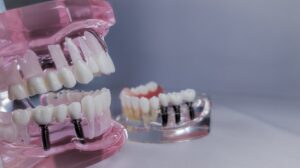How Your Oral Health Affects Your Entire Body
Having a bright, healthy smile is just part of the oral health equation. When a patient ignores their oral health, they may unknowingly be at risk for serious health issues.
The mouth is the entryway to both the respiratory and digestive tracts. While regular brushing and saliva production fight off some harmful bacteria, health issues can increase bacterial formation. Furthermore, poor oral health care may result in tooth and gum infections. Left untreated, bacteria can enter the bloodstream and cause serious illness.
Here’s how your oral health affects your body:
If you’re experiencing signs of gum disease or other oral infection, visit your Fioritto dentist immediately. Regular checkups, brushing, flossing, and rinsing with mouthwash will fight gum disease and help prevent other illnesses.
When gum disease leads to tooth loss, Dr. Mike can help. Implant options are available, even for people who have experienced jawbone loss. Whether you’re missing one tooth or several, implants can help you eat, speak, drink and smile just as if you had your natural teeth.
If you’re a good candidate for dental implants, Dr. Mike and the Cleveland Implant Institute can help restore your smile. Call us today to schedule a consultation, and find out how we can help protect both your oral and overall health.
Mentor Office
6303 Center St
Mentor, OH 44060-2467
Concord Office
8245 Auburn Road
Concord, OH 44077






